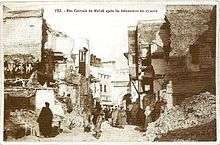1912 Fez riots

The Fez Riots, also known as the Fez Mutiny, Fez Uprising, Tritl (by the Jewish community), and Fez's Bloody Days (from French: Les Journées Sanglantes de Fès) were riots which took place in Fez, then the capital of Morocco, shortly after the signing of the Treaty of Fez which created the French protectorate in Morocco.[1]
Shortly before the riots the population of Fez learnt about the treaty, and in general viewed it as a betrayal by Sultan Abd al-Hafid who had travelled to Rabat to ensure his safety. After the riots he was forced to abdicate in favor of his brother Yusuf.[2]
Despite warnings of an uprising, most French troops left Fez, leaving behind 1,500 French troops and 5,000 Moroccan Askars (infantrymen) commanded by French officers. On the morning of 17 April, the French officers announced the new measures to their Askars. Many units immediately mutinied, causing a total loss of control.
The soldiers attacked their French commanders, then left their barracks and attacked the European and Jewish quarters of the city. French artillery shelling was used to force the rebels to surrender, which took place after two days. The death toll included 66 Europeans, 42 Jews and some 600 Moroccans.[3]
The first account of the riot was written by Hubert Jacques, a journalist at Le Matin, and a personal friend of Resident-General Hubert Lyautey. The report was strongly critical of Eugène Regnault.[4]
External links
- Jacques, Hubert (1913), Les journées sanglantes de Fez, 17-18-19 avril 1912: les massacres ; récits militaires ; responsabilités, Libraririe Chapelot
- Burke III, Edmund, "The Fez Mutiny and the Revolt of El Hiba", Prelude to Protectorate in Morocco: Pre-Colonial Protest and Resistance, 1860-1912, University of Chicago Press, 2009, ISBN 9780226080840
- Gershovich, Moshe (2000). "Pre-Colonial Morocco: Demise of the Old Mazhkan". French Military Rule in Morocco: colonialism and its consequences. Routledge. ISBN 0-7146-4949-X.
References
- ↑ Mohammed Kenbib. "Fez Riots (1912)." Encyclopedia of Jews in the Islamic World. Executive Editor Norman A. Stillman. Brill Online, 2014
- ↑ Gershovich 2000, p. 56.
- ↑ Gershovich 2000, p. 57: "The result was a total loss of control by the French instructors over some units which turned into an anarchic, violent mob. The mutineers attacked their French commanders and then spread to the streets of Fez in search of any European they could find. The Jewish quarter (mellah) was leveled before order was restored on 19 April when French artillery shelled the centers of resistance and forced the rebels to surrender. The toll of casualties included 66 Europeans, 42 Jews and some 600 Moroccans killed."
- ↑ French Military Rule in Morocco: Colonialism and its Consequences, Moshe Gershovich, p.62